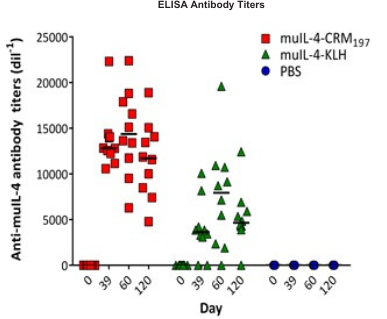Anti-IL-4 Conjugate Vaccine Prepared with PeliCRM197 is More Immunogenic than KLH Analog

Background
Anti-interleukin 4 (IL-4) conjugate vaccines consist of IL-4 chemically coupled to a carrier protein.
Immunizations with these vaccines, in combination with an adjuvant, elicit the production of polyclonal anti-IL-4 neutralizing antibodies in mice. We aimed to evaluate two widely used carrier proteins, CRM197 (a non-toxic diphtheria toxin mutant) produced with Pfenex Expression Technology®, and KLH (keyhole limpet hemocyanin), by manufacturing one vaccine with each carrier protein and comparing their immunogenicity in mice.
BALB/c mice received four intramuscular injections of murine IL-4 conjugate vaccine (prepared with CRM197 or KLH) or PBS, all emulsified with a squalene oil-in-water adjuvant.
Blood collections were performed before dosing and at days 39, 60 and 120. Serum samples of immunized mice were assessed for the presence of anti-muIL-4 antibodies by ELISA and their muIL-4 neutralizing capacities (NC50) evaluated in a proliferative cellular bioassay using CTLL-2 cells.
In the group receiving the vaccine prepared with CRM197 (muIL-4-CRM197), anti-muIL-4 antibodies were detected in all mice (10/10), at all timepoints post immunization, with a peak of the response at day 60 (median titer: 14364 dil-1).

The neutralizing capacities of the antimuIL- 4 antibodies were stronger in the group of mice immunized with the vaccine prepared with Pfenex’s CRM197 versus KLH, with a greater number of responder mice at all timepoints post immunization. These results indicate that Primrose’s CRM197 is superior to KLH as a carrier protein in muIL-4 conjugate vaccines, in both the quantity of anti-muIL-4 antibodies produced (antibody titers) and their quality (neutralizing capacities).

PURCHASE AND/OR USE OF THIS PRODUCT SHALL CONSTITUTE ACKNOWLEDGMENT AND ACCEPTANCE OF OUR TERMS AND CONDITIONS.